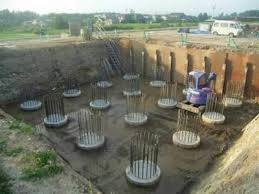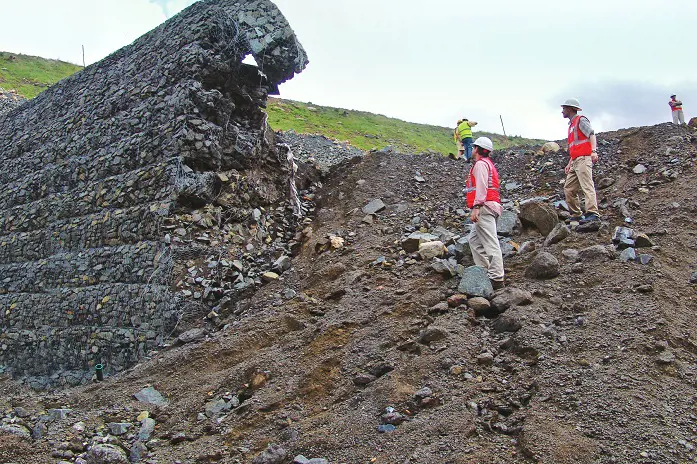Recognizing the Principles: Concerning Geotechnical Engineering in Modern Construction
The Significance of Geotechnical Engineering in Attending To Environmental Challenges and Enhancing Building Safety
Geotechnical engineering offers as a foundation in the junction of ecological stewardship and building safety, supplying vital understandings into the actions of dirt and rock under numerous conditions. By implementing critical website examinations and tailored reduction procedures, geotechnical designers play an essential role in securing both human lives and eco-friendly integrity.

Duty of Geotechnical Engineering
Geotechnical design plays a vital duty in the design and building and construction of framework by attending to the behavior of soil and rock products under different problems. This area of design is important for recognizing the communication between frameworks and the ground, which consists of figuring out the load-bearing capacity of soil, evaluating stability, and predicting prospective settlement or failure.
Geotechnical engineers are responsible for performing website investigations, which involve tasting and screening soil and rock to collect information on their physical and chemical residential properties. This information is important for making foundations, preserving walls, and other earth-retaining frameworks that make sure safety and security and durability. Furthermore, geotechnical engineering informs the choice of proper building and construction methods and products, consequently decreasing threats connected with soil actions.
In addition, the integration of geotechnical engineering principles into urban planning and environmental management is critical for resolving difficulties such as ground contamination and groundwater monitoring. By understanding geotechnical variables, engineers can create sustainable solutions that boost the durability of infrastructure against all-natural risks, while likewise promoting environmental stewardship. Inevitably, the role of geotechnical engineering is vital for attaining safe, sturdy, and eco mindful construction techniques.
Dirt Disintegration Mitigation
Soil disintegration presents a significant risk to both environmental stability and framework stability, affecting about 24 billion heaps of fertile soil lost every year worldwide. This sensation is intensified by aspects such as logging, urbanization, and bad agricultural methods. Geotechnical engineering plays a critical duty in developing effective dirt erosion reduction techniques that guard both the setting and building tasks.
One strategy entails the execution of erosion control methods such as vegetation planting, which stabilizes soil via origin systems. Furthermore, the building and construction of retaining terraces and walls can effectively reduce surface area drainage and protect prone areas from disintegration. Appropriate drain layout is likewise vital; it reduces water build-up and routes excess runoff far from important frameworks.
Additionally, geotechnical designers employ dirt stablizing techniques, such as the application of geotextiles and biodegradable floor coverings, to improve soil cohesion and stop deterioration - all about geotechnical engineering. Regular surveillance and evaluation of erosion-prone websites allow prompt treatments, making certain lasting sustainability. By incorporating these approaches, geotechnical engineering not just reduces the effects of dirt erosion but likewise adds to the resilience of infrastructure versus environmental obstacles, ultimately cultivating a safer and extra sustainable developed atmosphere
Groundwater Defense Techniques
Groundwater functions as a vital source for drinking water, farming, and industrial processes, making its defense essential for ecological sustainability and public health and wellness. Efficient groundwater security strategies are critical in alleviating contamination threats and making certain the durability of this source.

Normal surveillance of groundwater high quality is also crucial, allowing very early detection of contamination sources and promoting timely removal initiatives. Using sophisticated modern technologies, such as geophysical studies and remote sensing, help in identifying prospective dangers to groundwater books.
Additionally, public education and learning and stakeholder engagement are critical, promoting area assistance for groundwater protection efforts. geotechnical specialist. By combining governing steps, technological advancements, and area involvement, we can create a detailed framework that safeguards groundwater sources while advertising sustainable advancement and building techniques
Landslide Risk Administration
Landslides position substantial threats to both human security and facilities, making reliable threat administration strategies vital. Geotechnical engineering plays a critical role in identifying, assessing, and mitigating landslide threats. A thorough understanding of incline security, dirt mechanics, and hydrology is vital for creating reliable danger monitoring plans.
The very first step in landslide risk monitoring involves detailed website investigations, which consist of geological mapping and soil screening. These investigations assist designers evaluate the capacity for landslides by recognizing critical factors such as incline angles, dirt make-up, and water material. Using innovative technologies such as remote picking up and geophysical surveys can enhance the precision of these assessments.
As soon as risks are recognized, appropriate reduction procedures can be executed. These might consist of design services such as maintaining walls, drain systems, and slope stablizing methods. In addition, keeping track of systems should be established to spot indications of ground movement and changes in water degrees, enabling aggressive treatments.

Enhancing Construction Safety And Security
Building and construction sites frequently offer a myriad of basics threats that can endanger worker security and task stability. Geotechnical engineering plays an essential duty in enhancing construction safety by providing necessary insights into subsurface conditions. Through detailed soil and rock analysis, geotechnical designers can determine possible dangers, such as soil instability, groundwater problems, and seismic vulnerabilities, which might compromise the safety of building activities.
Implementing geotechnical options, such as proper foundation layout and the use of maintaining structures, alleviates these threats substantially. These solutions not only guarantee the security of the structures being constructed yet also create a much safer working environment for building and construction personnel.
Additionally, cultivating a culture of security with training and adherence to established go safety procedures even more improves building and construction site safety and security. By integrating geotechnical competence into the preparation and execution phases, building projects can attain greater safety and security requirements, inevitably securing workers and guaranteeing effective job conclusion.
Verdict
In verdict, geotechnical design offers as a vital self-control in tackling ecological obstacles and advertising building safety. With effective dirt disintegration mitigation, groundwater protection strategies, and landslide threat administration, geotechnical engineers add to the advancement of durable infrastructure.
Geotechnical design serves as a cornerstone in the crossway of environmental stewardship and building security, providing vital insights into the behavior of dirt and rock under numerous conditions. Geotechnical design educates the option of suitable building and construction techniques and materials, consequently minimizing risks connected with dirt actions.
Geotechnical design plays a pivotal function in establishing reliable soil erosion reduction techniques that protect both the setting and construction projects.
Furthermore, geotechnical engineers employ dirt stablizing techniques, such as the application of geotextiles and biodegradable floor coverings, to improve dirt communication and prevent degradation. Through extensive soil and rock evaluation, geotechnical designers can determine possible dangers, such as dirt instability, groundwater problems, and seismic susceptabilities, which might compromise the click to find out more security of building tasks.